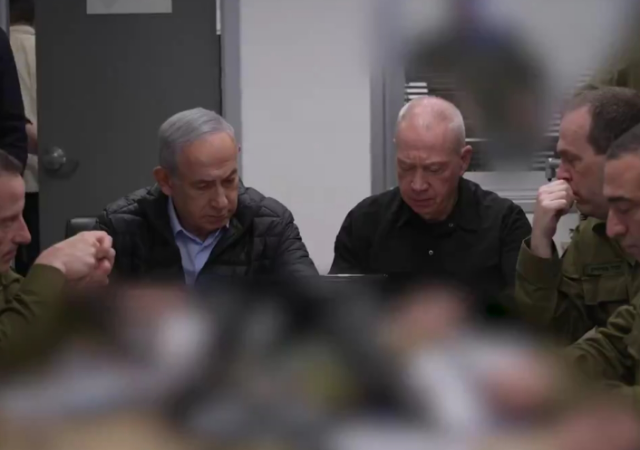Israel Hits Iranian Military Targets in Retaliatory Airstrike

Israel on Friday night carried out a large-scale airstrike on Iran, targeting Tehran’s missile manufacturing facilities and hitting its air defense systems.
“A short while ago, our planes returned safely after striking military targets in Iran. This was in response to Iran’s attacks against the State of Israel in recent months,” IDF Spokesperson, Rear Admiral Daniel Hagari, announced Friday night. “The retaliatory strike has been completed, and its objectives have been achieved.”
“The attack occurred in three major waves, with the second and third waves targeting Iranian drone and missile production sites, hitting over 20 targets,” the Jerusalem Post reported.
The IDF also destroyed Iranian terrorist assets in Syria and Iraq. “Israel also attacked targets in Syria, with the Syrian military confirming that the IDF had struck sites across central and southern Syria,” the Israeli newspaper added. “Explosions were also reported in Iraq as part of the series of responses to Iran and its proxy groups throughout the region.”
The targeted hit by Israeli fighter jets “included missile manufacturing facilities used by Iran in its attacks on the State of Israel over the past year,” the IDF disclosed.
The Israeli Air Force (IAF) also “targeted Iran’s surface-to-air missile arrays and Iranian aerial capabilities that were intended to restrict Israel’s aerial freedom of operation in Iran. Israel now has broader aerial freedom of operation in Iran,” the Israeli military added. Iran possesses several Russian-made advanced air defense systems deployed to guard its Islamic Guard (IRGC) sites and nuclear weapons program.
The IAF hit targets Iranian cities of Isfahan and Karaj, home to Iran’s rogue nuclear weapons program. “The strikes were carried out in several waves over the course of several hours, in various areas of Iran, with the Islamic Republic closing its airspace for the duration and seemingly showing little ability to counter the assault,” The Times of Israel reported. “Strikes were reported in the Tehran, Karaj, Isfahan and Shiraz areas.”
IDF: Iran’s more vulnerable to future strikes after air defenses hit
The overnight operation appears to have degraded Iran’s air defense capabilities, making the regime’s nuclear weapons program and terrorist assets more vulnerable to future strikes. “The Israeli military said its strikes targeting Iran’s air defences on Saturday had given it more freedom to operate in skies over Iran,” the France24 TV channel reported.
The Israeli counter-strike, named the “Days of Repentance,” hit selected targets deep inside Iran with precision, the newspaper Israel Hayom reported:
In a significant military operation dubbed “Days of Repentance,” the Israel Defense Forces (IDF) conducted a series of precision strikes against military targets inside Iran, marking a direct response to Iran’s recent attacks on Israel.The operation began in the early hours Saturday morning as explosions were first reported near Tehran, followed by additional strikes in Syria. The military campaign quickly expanded to include multiple waves of attacks targeting missile production facilities, air defense systems, and ground-to-ground missile launchers across several regions in Iran, including Isfahan, Mashhad, and Kurdistan.Dozens of fighter jets, intelligence aircraft, and refueling planes participated in the operation, striking targets more than 1,600 kilometers (1,200 miles) from Israel. The IDF confirmed that all aircraft returned safely to their bases following the mission’s completion.
The overnight strike was a direct response to Iran firing around 180 missiles into Israel in early October. In mid-April, Iran launched hundreds of drones and cruise missiles in a similar attack. “Iran attacked Israel twice, including in locations that endangered civilians, and has paid the price for it,” IDF spokesman Rear Admiral Hagari said. “This is a clear message – those who threaten the State of Israel will pay a heavy price.”
The Iranian regime admitted to Israeli aerial raids on its military installations. “Iran’s air defence forces said in a statement that bases in Tehran, Khuzestan and Ilam provinces were attacked,” the BBC reported.
Iran downplays IDF strike, vows retaliation
The Iranian regime tried to downplay the Israeli strike. “Iranian media initially appeared to downplay the airstrikes, noting that Tehran’s airport was operating normally. State TV reported several strong explosions heard around the capital, while the state news agency, IRNA, said there had been no casualties,” the British newspaper Guardian reported.
The Mullah regime is yet to issue an official statement following the massive air raid. “There was no immediate official comment about the source of explosions, which Iranian news outlets reported were under investigation. Air defence systems were activated around the country,” the daily added.
Sky News UK reported on Saturday:
A former head of Iran’s Islamic Revolution Guard Corps (IRGC) says Israel’s attack on Iran was a sign of “fear and flight”.Mohsen Rezaee said in a post to X that Israel’s “aggression against Iran was more than a show of power, it was a story of their fear and flight”.Israel said its attack was in response to Tehran’s ballistic missile assault on the country more than three weeks ago.Iran has downplayed the impact, saying “limited damage” was caused.
The armed forces are prepared for an Iranian strike. Israel’s “defensive and offensive capabilities are fully mobilized” to counter an Iranian aggression, the IDF assured.
Source: Israel attack destroyed component in ballistic missile program
Axios found out that the Israeli strikes destroyed a key part of Itan’s ballistic missile program:
Why it matters: The destruction of the equipment severely damages Iran’s ability to renew its missile stockpile and could deter Iran from further massive missile strikes against Israel, the sources said.
The sources said Israel hit 12 “planetary mixers” used to produce solid fuel for long-range ballistic missiles, which make up the bulk of Iran’s missile arsenal. A senior U.S. official confirmed that the strike cripples Iran’s missile production capability.
CLICK HERE FOR FULL VERSION OF THIS STORY